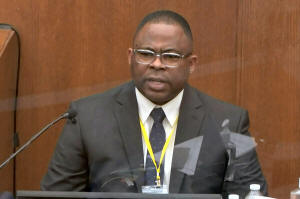Chauvin had no need for force after Floyd was handcuffed and prone,
expert testifies
 Send a link to a friend
Send a link to a friend
 [April 08, 2021]
By Jonathan Allen and Brendan O'Brien [April 08, 2021]
By Jonathan Allen and Brendan O'Brien
MINNEAPOLIS (Reuters) -A national expert in
the proper use of force by police testified on Wednesday that former
Minneapolis officer Derek Chauvin had no need to kneel on the neck of
George Floyd once he was handcuffed and prone.
Los Angeles Police Department Sergeant Jody Stiger appeared as a
prosecution witness at Chauvin's murder trial, offering testimony
intended to show that the defendant disregarded his training during his
deadly arrest of the 46-year-old Black man last May.
Stiger told jurors that Floyd posed no immediate threat and was not
actively resisting when Chauvin used deadly force on him by pinning his
neck to the ground for more than nine minutes.
"My opinion was that no force was reasonable in that position," Stiger
testified. "The pressure ... caused by the body weight could cause
positional asphyxia and could cause death."
Floyd's death, captured on video widely viewed on social media, prompted
protests against racism and police brutality in many cities across the
United States and around the world.

Chauvin, who is white, has pleaded not guilty to murder and manslaughter
charges, arguing that he was following the training he had received in
his 19 years on the police force. Three other officers on the scene have
been charged with aiding and abetting murder and will stand trial later
this year.
Chauvin and the three other officers were attempting to arrest Floyd on
suspicion of using a fake $20 bill to buy cigarettes at a food store.
They were fired the day after the incident.
Stiger, who has reviewed 2,500 cases in which police used force, resumed
his testimony after first appearing on Tuesday.
Prosecutor Steve Schleicher asked him to describe several photographs
showing officers restraining Floyd. Stiger testified that it appeared
Chauvin's use of force was excessive.
"He was handcuffed, not attempting to resist, not attempting to assault
officers, kick, punch of that nature," Stiger said of Floyd.
Stiger testified that Chauvin squeezed Floyd's hand to get him to comply
with the officer's orders while he was handcuffed in the prone position
and that Floyd did not appear to have an opportunity to comply.
"At that point, it was just pain," Stiger said.
'HAS TO BE PROPORTIONAL'
Questioned by defense lawyer Eric Nelson, Stiger agreed that a police
officer needed to take into account various factors during a fluid
situation when considering using force.
[to top of second column]
|

Sergeant Jody Stiger of the Los Angeles Police Department answers
questions during the eighth day of the trial of former Minneapolis
police officer Derek Chauvin for second-degree murder, third-degree
murder and second-degree manslaughter in the death of George Floyd
in Minneapolis, Minnesota, U.S. April 7, 2021 in a still image from
video. Pool via REUTERS

"It has to be proportional," Stiger said. "You are constantly
reassessing during the time frame."
Stiger also agreed with Nelson that Chauvin came upon a situation in
which a suspect was actively resisting officers who were trying to
put him into a police squad car as people in a crowd yelled insults
at them, posing a "potential threat."
Nelson showed Stiger photographs taken at different times of the
incident showing Chauvin with his knee on Floyd. Nelson asked Stiger
whether he agreed that Chauvin's knee was on Floyd's shoulder blades
rather than his neck.
"It appears to be more above the shoulder blades than on the
shoulder blades," Stiger testified, not agreeing with Nelson.
Prosecutors then called three Minnesota Bureau of Criminal
Apprehension investigators, including Senior Special Agent James
Reyerson, an expert on the use of force and the lead investigator in
the case.
Part of Reyerson's testimony involved the investigation of the
police squad car and Floyd's Mercedes Benz vehicle.
Reyerson testified that six months after the incident, Chauvin's
lawyers re-examined the police car and found what was later
determined to be pills that had Floyd's DNA on them. During its
opening statement in the trial, Chauvin's defense team said the
pills contained methamphetamine with fentanyl.
Reyerson agreed with Nelson that it sounded on one video of the
incident as if Floyd said he "ate too many drugs." But during more
questioning later from the prosecution, Reyerson agreed that it
sounded as if Floyd said: "I ain't do no drugs."
Later in the day, McKenzie Anderson, a forensic scientist with the
bureau, took the stand to describe collecting pills from the
vehicles over the course of the investigation, including whole and
partial tablets from the police squad car.

She testified that Floyd's blood was found in the back of the squad
car and that pills found in the vehicle had saliva that matched
Floyd's DNA.
(Reporting by Jonathan Allen in Minneapolis and Brendan O'Brien in
Chicago; Editing by Will Dunham and Peter Cooney)
[© 2021 Thomson Reuters. All rights
reserved.] Copyright 2021 Reuters. All rights reserved. This material may not be published,
broadcast, rewritten or redistributed.
Thompson Reuters is solely responsible for this content. |